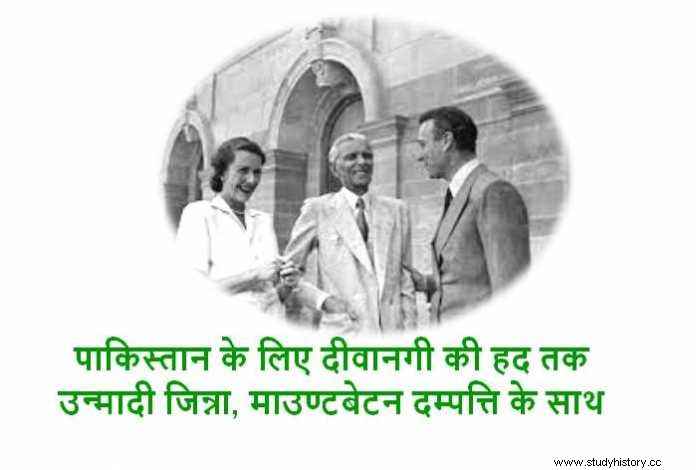
While many Congress leaders including Gandhiji, Khan Abdul Ghaffar Khan and Maulana Azad still understood that partition would be averted in some way or the other, Mountbatten knew what the truth was! Mountbatten wrote -
'Jinnah was so intent on partitioning the country that none of my words entered his ears, though I made every move I could, every appeal I could imagine I could come. The dream of giving birth to Pakistan had seemed like a mite to him. None of the arguments worked.
……. Jinnah's power had grown immensely for two reasons. He had succeeded in making himself the emperor of the Muslim League. The other members of the League might have agreed to a compromise, but as long as Jinnah was alive, those members could not open their mouths.'
Mountbatten had recognized the hysteria that was hidden in Jinnah's insistence, be debated, do it, be done. Jinnah is not going to listen. When there is no listener, then the meaning of spending time behind the debate, increasing the danger of civil war even more?
Patel passed a resolution for the partition of Punjab and Bengal and explained to the Congressmen that since Pakistan is to be formed on the basis of Islamic and non-Islamic population, Hindus of Punjab and Bengal have the right to live in India, Jinnah will allow them to stay in Pakistan. Therefore, before the partition of India, Punjab and Bengal should be divided.
Patel explained to the Congressmen that Jinnah would under no circumstances accept a Pakistan that did not have the whole of Punjab and the whole of Bengal, thus averting the partition of India. The Congressmen found Patel's point appropriate. Some believed that Patel had prepared a proposal for provincial division to prevent the partition of India. Moseley wrote -
'Patel knew more precisely what he was saying than all his peers. Patel presented the proposal for partition of India before the Congress Working Committee. In this resolution, there was a recommendation to divide Punjab into two parts. One piece belongs to the Hindus, the other to the Muslims. The Sikhs had the freedom to decide for themselves where they would live. The indication of the decision was clear. If Congress can accept the partition of a state, then how can it oppose the partition of the country! As the organizer and director of the Congress, he felt that the Muslim League as the opposition party in independent India meant trouble, the end of the Congress plans, the prohibition of laws.
…….
…… I do not think the British Government will agree to this partition. Eventually the wisdom will come to hand over the government to the powerful party. And if it doesn't come, it doesn't matter. There will be a strong central government, East Bengal, some part of Punjab, Sindh and Balochistan will be independent under this centre. The center will be so powerful that eventually they too will come into it.'
Nehru liked this plan. He wanted to give a message to Jinnah through this partition that if he asks for partition, then this may also be his fate. When Maulana Azad and Gandhi were out of Delhi, this resolution was passed in the Congress Working Committee.
Patel may have been convincing the Congressmen that he was playing this trick to suppress the demand for Pakistan, but in fact he was cleverly moving towards the partition of India through this proposal, because till the time the Congress was divided between Punjab and Bengal. Till then the decision of partition of India was not possible and Patel got this decision made by Congress in the absence of Gandhi and Azad.
